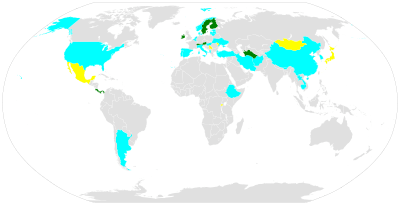Neutrality (international relations) facts for kids
A neutral country is like a referee in a game. It chooses not to pick a side or get involved in a War between other countries. Imagine two teams playing a game; a neutral country is the one that just watches from the sidelines.
International law allows a country to stay neutral when there's a war. If a country says it's neutral, it cannot let its land be used as a base for one side. It also can't build warships, recruit soldiers, or plan military trips for any fighting group. Sometimes, this is called "armed neutrality" because the country might still have a strong army to protect itself. This is different from being "permanently neutral," which means always staying out of conflicts. It's also not the same as groups like the United Nations peacekeeping teams, who are neutral in a different way.
Contents
Countries That Stay Neutral
Some countries have chosen to stay neutral for a very long time. This means they try to avoid taking sides in fights between other nations.
Always Neutral Nations
The Vatican City is a great example of a permanently neutral country. It officially declared this in 1929 with the Lateran Treaty.
Switzerland has a very long history of staying neutral. Because of this, it became a popular place for many important organizations to set up their main offices. The International Red Cross, which helps people in need, started in Geneva in the mid-19th century. The League of Nations, an early version of the United Nations, also had its main office in Geneva and recognized Switzerland's neutrality in 1920. Even after the League ended, Switzerland kept its neutral status.
| country | Neutrality Period | Notes |
|---|---|---|
| 1949– | Costa Rica has been neutral since its military was ended in 1949. This was made a law in 2014. | |
| 1868– | Liechtenstein is neutral because its military was dissolved in 1868. | |
| 1989- | The neutrality of the Panama Canal is protected by a special agreement. | |
| 1815– | Switzerland is the oldest neutral country, staying neutral since 1815. It has not fought a foreign war since then. Its neutrality helps keep it safe. | |
| 1995– | Turkmenistan declared its full neutrality, and the United Nations officially recognized it in 1995. | |
| 1929– | The Lateran Treaty of 1929 made Vatican City neutral. It said the Pope would stay neutral in international matters. |
Note: Whether a country that is part of the European Union can truly be neutral is a topic people discuss. We'll look at this below.
European Union Countries That Were Neutral
Some countries that are now part of the European Union used to be neutral. Joining the EU can change how a country acts in world politics.
| country | Neutrality Period | Notes |
|---|---|---|
| 1920–1938 (after World War I to being taken over by Germany) 1955–1995 (from its neutrality declaration to joining the EU) |
Austria declared itself "permanently neutral" in 1955. | |
| 1935–1939 (until the Winter War) 1956–1995 (from getting back a rented area to joining the EU) |
Finland joined the UN in 1955 but kept its neutral status for a while. | |
| 1939–1973 (until joining the EU) | Ireland chose to be neutral during World War II. It joined the UN in 1955 but kept its neutral policy. | |
| 1980–2004 (until joining the EU) | Malta had a policy of neutrality starting in 1980. | |
| 1814–1918 (until the Finnish Civil War) 1918–1995 (until joining the EU) |
Sweden has been neutral since 1809. It stayed neutral during both World Wars. |
Countries That Claim Neutrality
Some countries say they are neutral, even if their actions might sometimes seem otherwise.
| country | Claimed Neutrality Period | Notes |
|---|---|---|
| 2012 | In 2012, Ghana announced a "closed-neutral policy" after its president passed away. | |
| 1947 | Japan's constitution says it cannot take part in wars. However, it has strong self-defense forces and a military alliance with the United States. | |
| 1930 | Mexico has generally been neutral, except when it joined the Allies in World War II. It has welcomed political refugees. | |
| 1914–1918 2015 |
Mongolia was neutral during World War I. In 2015, its president announced a "policy of permanent neutrality." | |
| 1994 | Moldova's 1994 constitution states that it has "permanent neutrality." | |
| 2009 | After the 1994 genocide, Rwanda announced permanent neutrality in 2009. | |
| 2007 | Serbia's National Assembly declared armed neutrality in 2007. Its future neutrality might change if it joins military groups like NATO. |
Images for kids
-
Irish units on UN patrol in the Golan Heights, Syria.
See also
 In Spanish: País neutral para niños
In Spanish: País neutral para niños
 | Kyle Baker |
 | Joseph Yoakum |
 | Laura Wheeler Waring |
 | Henry Ossawa Tanner |




